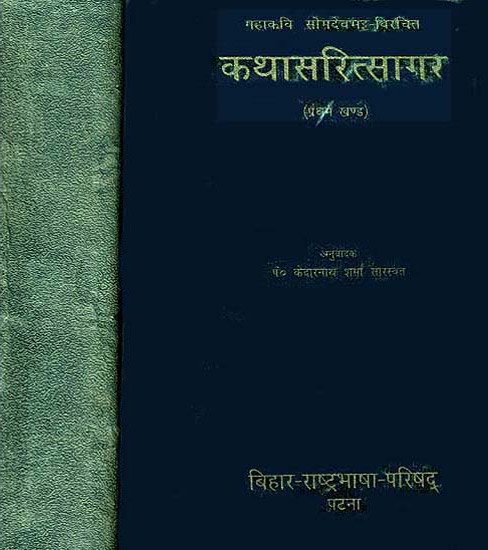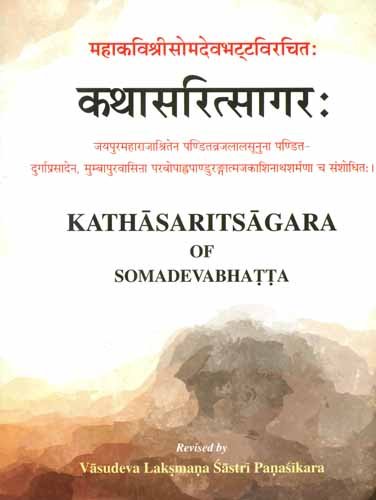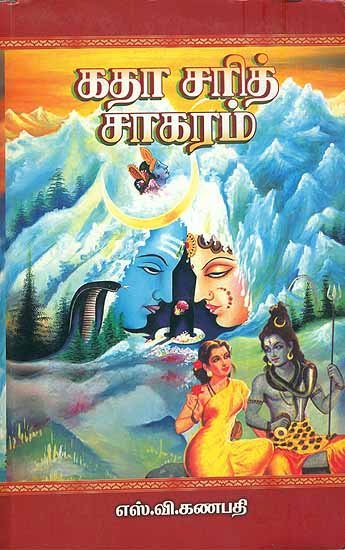Kathasaritsagara [sanskrit]
by C. H. Tawney | 2014 | 226,424 words | ISBN-13: 9789350501351
The Sanskrit edition of the Kathasaritsagara referencing the English translation and grammatical analysis. Written by Somadeva and dating from the 12th century, the Kathasaritsagara (or Katha-sarit-sagara) represents an epic legend narrating the adventures of Naravahanadatta as he strives to become the destined emperor of the Vidyadharas. Alternative titles: (Kathāsaritsāgara, कथासरित्सागर, Kathā-sarit-sāgara)
Verse 3.4.405
इत्याप्तराज्यविभवः क्रमशः स कृत्स्नां जित्वा महीमखिलराजकपूजिताङ्घ्रिः ।
ताभिः समं विगतमत्सरनिर्वृताभिर् भद्रासखश्चिरमरंस्त निजप्रियाभिः ॥ ४०५ ॥
ityāptarājyavibhavaḥ kramaśaḥ sa kṛtsnāṃ jitvā mahīmakhilarājakapūjitāṅghriḥ |
tābhiḥ samaṃ vigatamatsaranirvṛtābhir bhadrāsakhaściramaraṃsta nijapriyābhiḥ || 405 ||
The English translation of Kathasaritsagara Verse 3.4.405 is contained in the book The Ocean of Story by C.H. Tawney. This book is available online or you could buy the latest edition:
Read online Buy now! The English translation by C.H. Tawney (2014)
Glossary of Sanskrit terms
Note: This extracts Sanskrit terms and links to English definitions from the glossary, based on an experimental segmentation of verse (3.4.405). Some terms could be superfluous while some might not be mentioned. Click on the word to show English definitions.
Iti, Itya, Apta, Rajyavibhava, Kramashah, Kramashas, Kritsna, Jitvan, Mahi, Akhila, Rajaka, Pujita, Anghri, Samam, Sama, Vigata, Vrita, Bhadra, Sakha, Ciram, Cira, Nija, Priya,
Analysis of Sanskrit grammar
Note: this is an experimental feature and only shows the first possible analysis of the Sanskrit text (Kathasaritsagara Verse 3.4.405). If the system was successful in segmenting the sentence, you will see of which words it is made up of, generally consisting of Nouns, Pronouns, Verbs, Participles and Indeclinables. Click on the link to show all possible derivations of the word.
- Line 1: “ityāptarājyavibhavaḥ kramaśaḥ sa kṛtsnāṃ jitvā mahīmakhilarājakapūjitāṅghriḥ ”
- ityā -
-
itya (noun, masculine)[compound], [vocative single]itya (noun, neuter)[compound], [vocative single]√i -> itya (absolutive)[absolutive from √i]iti (noun, feminine)[instrumental single]ityā (noun, feminine)[nominative single]√i -> itya (participle, masculine)[vocative single from √i class 2 verb]√i -> itya (participle, neuter)[vocative single from √i class 2 verb]√i -> ityā (participle, feminine)[nominative single from √i class 2 verb]
- apta -
-
apta (noun, masculine)[compound], [vocative single]apta (noun, neuter)[compound], [vocative single]
- rājyavibhavaḥ -
-
rājyavibhava (noun, masculine)[nominative single]
- kramaśaḥ -
-
kramaśaḥ (indeclinable)[indeclinable]kramaśas (noun, neuter)[compound], [nominative single], [vocative single], [accusative single]
- sa -
-
sa (noun, neuter)[compound], [vocative single]sa (noun, masculine)[nominative single]
- kṛtsnām -
-
kṛtsnā (noun, feminine)[accusative single]
- jitvā -
-
√ji -> jitvā (absolutive)[absolutive from √ji]√ji -> jitvā (absolutive)[absolutive from √ji]jitvan (noun, masculine)[nominative single]
- mahīm -
-
mahī (noun, feminine)[accusative single]
- akhila -
-
akhila (noun, masculine)[compound], [vocative single]akhila (noun, neuter)[compound], [vocative single]
- rājaka -
-
rājaka (noun, masculine)[compound], [vocative single]rājaka (noun, neuter)[compound], [vocative single]
- pūjitā -
-
pūjita (noun, masculine)[compound], [vocative single]pūjita (noun, neuter)[compound], [vocative single]pūjitā (noun, feminine)[nominative single]√pūj -> pūjita (participle, masculine)[vocative single from √pūj class 1 verb], [vocative single from √pūj class 10 verb]√pūj -> pūjita (participle, neuter)[vocative single from √pūj class 1 verb], [vocative single from √pūj class 10 verb]√pūj -> pūjitā (participle, feminine)[nominative single from √pūj class 1 verb], [nominative single from √pūj class 10 verb]√pūj (verb class 1)[periphrastic-future active third single]
- aṅghriḥ -
-
aṅghri (noun, masculine)[nominative single]
- Line 2: “tābhiḥ samaṃ vigatamatsaranirvṛtābhir bhadrāsakhaściramaraṃsta nijapriyābhiḥ ”
- tābhiḥ -
-
tā (noun, feminine)[instrumental plural]sā (noun, feminine)[instrumental plural]
- samam -
-
samam (indeclinable)[indeclinable]sama (noun, masculine)[adverb], [accusative single]sama (noun, neuter)[adverb], [nominative single], [accusative single]samā (noun, feminine)[adverb]
- vigatam -
-
vigata (noun, neuter)[adverb], [nominative single], [accusative single]vigata (noun, masculine)[adverb], [accusative single]vigatā (noun, feminine)[adverb]
- atsaran -
-
√tsar (verb class 1)[imperfect active third plural]
- ir -
-
i (noun, masculine)[nominative single]
- vṛtābhir -
-
vṛtā (noun, feminine)[instrumental plural]√vṛ -> vṛtā (participle, feminine)[instrumental plural from √vṛ class 1 verb], [instrumental plural from √vṛ class 5 verb], [instrumental plural from √vṛ class 9 verb]√vṛ -> vṛtā (participle, feminine)[instrumental plural from √vṛ class 5 verb], [instrumental plural from √vṛ class 9 verb]
- bhadrā -
-
bhadrā (noun, feminine)[nominative single]
- sakhaś -
-
sakha (noun, masculine)[nominative single]
- ciram -
-
ciram (indeclinable)[indeclinable]cira (noun, masculine)[adverb], [accusative single]cira (noun, neuter)[adverb], [nominative single], [accusative single]cirā (noun, feminine)[adverb]
- araṃsta -
-
√ram (verb class 1)[aorist active second plural], [aorist middle third single]
- nija -
-
nija (noun, masculine)[compound], [vocative single]nija (noun, neuter)[compound], [vocative single]
- priyābhiḥ -
-
priyā (noun, feminine)[instrumental plural]
Other editions:
Also see the following editions of the Sanskrit text or (alternative) English translations of the Kathasaritsagara Verse 3.4.405
Kathasaritsagar
by Kedarnath Sharma Saraswat (2005)
The Only Edition with the Sanskrit Text and its Hindi Translation (An Old and Rare Book) Set of 3 Vol.
Buy now!
Kathasaritsagara of Somadeva Bhatta (Sanskrit Text Only)
by Vasudeva Laksmana Sastri (2013)
Katha Sarit Sagar in Marathi
by H. A Bhave (1995)
Set of 5 Volumes; Published by Varada Books, Pune. 2256 pages (Throughout B/W Illustrations).
Buy now!
Katha Sarit Sagara (Tamil)
by S. V. Ganapati (எஸ். வி. கணபதி) (2014)
[கதா சரித் சாகரம்] Published by Alliance Publications.
Buy now!
Galpa Shono
by Abhijit Chattopadhyay (2014)
[গল্প শোনো] Galpa Shono: Bengali Translation of 'Suno Kahani From Katha Sarit Sagar'; 9788126015436; Published by Sahitya Akademi, Delhi.
Buy now!Preview of verse 3.4.405 in Bengali sript:
ইত্যাপ্তরাজ্যবিভবঃ ক্রমশঃ স কৃত্স্নাং জিত্বা মহীমখিলরাজকপূজিতাঙ্ঘ্রিঃ ।
তাভিঃ সমং বিগতমত্সরনির্বৃতাভির্ ভদ্রাসখশ্চিরমরংস্ত নিজপ্রিযাভিঃ ॥ ৪০৫ ॥
![Kathasaritsagara [sanskrit] - book cover](/uploads/a/Katha-Sarit-Sagara.jpg)




